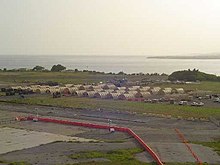
Ibrahim Ahmed Mahmoud al Qosi is a Sudanese militant and paymaster for al-Qaeda. Qosi was held from January 2002 in extrajudicial detention in the United States Guantanamo Bay detainment camps, in Cuba. His Guantanamo Internment Serial Number is 54.
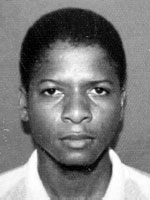
Ahmed Ghailani is a Tanzanian conspirator of the al-Qaeda terrorist organization convicted for his role in the bombing of embassies in Kenya and Tanzania. He was indicted in the United States as a participant in the 1998 U.S. embassy bombings. He was on the FBI Most Wanted Terrorists list from its inception in October 2001. In 2004, he was captured and detained by Pakistani forces in a joint operation with the United States, and was held until June 9, 2009, at Guantanamo Bay detention camp; one of 14 Guantanamo detainees who had previously been held at secret locations abroad. According to The Washington Post, Ghailani told military officers he is contrite and claimed to be an exploited victim of al-Qaeda operatives.

Abdul Rahim Hussein Muhammed Abdu al-Nashiri is a Saudi Arabian citizen alleged to be the mastermind of the bombing of USS Cole and other maritime attacks. He is alleged to have headed al-Qaeda operations in the Persian Gulf and the Gulf states prior to his capture in November 2002 by the CIA's Special Activities Division.
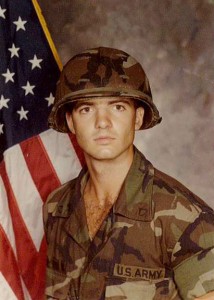
Layne Morris is a retired American special forces operative. On July 27, 2002, he was wounded and blinded in one eye during a gunfight in Afghanistan that left American combat medic Christopher J. Speer dead, allegedly at the hands of the Canadian accused terrorist Omar Khadr.
"A piece of the hand grenade shrapnel cut the optic nerve, so I'm blind in one eye."

Omar Ahmed Said Khadr is a Canadian who, at the age of 15, was detained by the United States at Guantanamo Bay for ten years, during which he pleaded guilty to the murder of U.S. Army Sergeant 1st Class Christopher Speer and other charges. He later appealed his conviction, claiming that he falsely pleaded guilty so that he could return to Canada where he remained in custody for three additional years. Khadr sued the Canadian government for infringing his rights under the Charter of Rights and Freedoms; this lawsuit was settled in 2017 with a CA$10.5 million payment and an apology by the federal government.
Ahcene Zemiri, also known as Hassan Zumiri, is an Algerian citizen who was for seven years a legal resident of Canada, where he lived in Montreal. He and his Canadian wife moved to Afghanistan in July 2001. They were separated when trying to leave in November 2001 and Zemiri was arrested and turned over to United States forces. He was transferred to the United States Guantanamo Bay detention camp in 2002, where he was detained for eight years without charge.
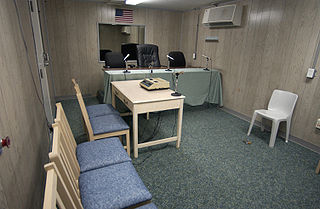
The Combatant Status Review Tribunals (CSRT) were a set of tribunals for confirming whether detainees held by the United States at the Guantanamo Bay detention camp had been correctly designated as "enemy combatants". The CSRTs were established July 7, 2004 by order of U.S. Deputy Secretary of Defense Paul Wolfowitz after U.S. Supreme Court rulings in Hamdi v. Rumsfeld and Rasul v. Bush and were coordinated through the Office for the Administrative Review of the Detention of Enemy Combatants.
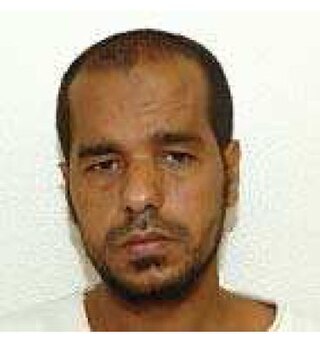
Salim Ahmed Salim Hamdan is a Yemeni man, captured during the invasion of Afghanistan, declared by the United States government to be an illegal enemy combatant and held as a detainee at Guantanamo Bay from 2002 to November 2008. He admits to being Osama bin Laden's personal driver and said he needed the money.
Abdullah Kamel Abdullah Kamel Al Kandari is a citizen of Kuwait, who was held in extrajudicial detention in the United States Guantanamo Bay detention camps, in Cuba.

Abdul Zahir is a citizen of Afghanistan, who was held in extrajudicial detention in the United States' Guantanamo Bay detention camps, in Cuba. He was the tenth captive, and the first Afghan, to face charges before the first Presidentially authorized Guantanamo military commissions. After the US Supreme Court ruled that the President lacked the constitutional authority to set up military commissions, the United States Congress passed the Military Commissions Act of 2006. He was not charged under that system.
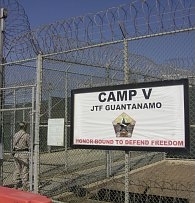
The Guantanamo Bay detention camp, also known as GTMO, GITMO, or simply Guantanamo Bay, is a United States military prison within Naval Station Guantanamo Bay (NSGB), on the coast of Guantánamo Bay, Cuba. It was established in January 2002 by U.S. president George W. Bush to hold terrorism suspects and "illegal enemy combatants" during the Global War on Terrorism following the attacks of September 11, 2001. As of January 2025, at least 780 people from 48 countries have been detained at the camp since its creation, of whom 756 had been released or transferred to other detention facilities, 9 died in custody, and 15 remain.

Obaidullah is a citizen of Afghanistan who was one of the last remaining Afghan detainees held in extrajudicial detention in the United States Guantanamo Bay detention camp, in Cuba. He was captured as an Enemy combatant on July 20, 2002, transferred to Guantanamo on October 28, 2002, and transferred to the United Arab Emirates on August 15, 2016. Obaidullah was released and repatriated to Afghanistan on 23 December 2019.
Ahmed Mohammed Ahmed Haza al-Darbi is a citizen of Saudi Arabia who was held in the United States Guantanamo Bay detainment camps, in Cuba from August 2002 to May 2018; in May 2018, he was transferred to Saudi Arabia's custody. He was the only detainee held at Guantanamo released during President Donald Trump's administration.

Ahmed Rashidi is a citizen of Morocco who was held in extrajudicial detention in the United States Guantanamo Bay detainment camps, in Cuba. Rashidi's Guantanamo ISN was 590. The Department of Defense reports that he was born on March 17, 1966, in Tangier, Morocco.

Ali Hamza Ahmad Suliman al-Bahlul is a Yemeni citizen who has been held as an enemy combatant since 2002 in the United States Guantanamo Bay detention camp. He boycotted the Guantanamo Military Commissions, arguing that there was no legal basis for the military tribunals to judge him.
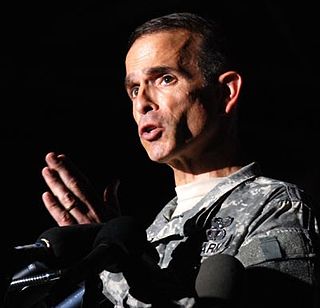
Attorney Lawrence J. Morris is the chief of staff and counselor to the president at The Catholic University of America and a retired United States Army colonel.
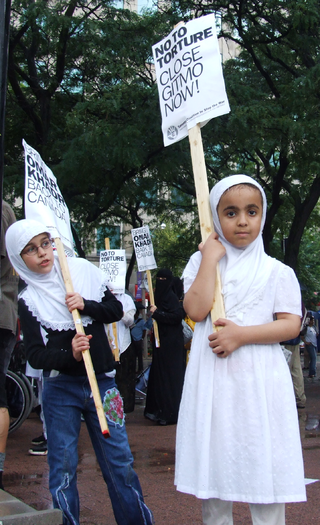
A Canadian of Egyptian and Palestinian descent, captured by American forces in Afghanistan at the age of 15, Omar Khadr was the last Western citizen remaining in custody in Guantanamo Bay. Canada refused to seek his extradition or repatriation despite the urgings of Amnesty International, the Canadian Bar Association, and other prominent organisations. His lawyer Dennis Edney has summarised the differential response towards Khadr stating that "one of the problems" with defending the youth is that he's a member of the Khadr family rather than "a Smith or an Arar"
Captain Keith A. Petty is an American lawyer and officer in the United States Army. He is notable for being appointed to serve as one of the prosecutors on the Guantanamo military commissions, and has taken his arguments to the press.

An underwire bra is a brassiere that utilizes a thin, semi-circular strip of rigid material fitted inside the brassiere fabric to help lift, separate, shape, and support a woman's breasts. The wire may be made of metal, plastic, or resin. It is sewn into the bra fabric and under each cup, from the center gore to under the wearer's armpit. Many different brassiere designs incorporate an underwire, including shelf bras, demi bras, nursing bras, and bras built into other articles of clothing, such as tank tops, dresses and swimsuits.

Carol Rosenberg is a senior journalist at The New York Times. Long a military-affairs reporter at the Miami Herald, from January 2002 into 2019 she reported on the operation of the United States' Guantanamo Bay detention camps, at its naval base in Cuba. Her coverage of detention of captives at the Guantanamo Bay detention camp has been praised by her colleagues and legal scholars, and in 2010 she spoke about it by invitation at the National Press Club. Rosenberg had previously covered events in the Middle East. In 2011, she received the Robert F. Kennedy Journalism Award for her nearly decade of work on the Guantanamo Bay detention camp.

